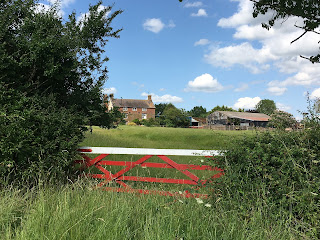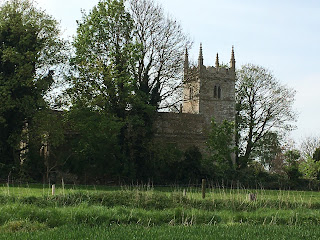HERD INSTINCT
 |
| Around here, different estates seem to colour-code their gates |
I park below the church in Tilton. A sales-type in a fleet car hovers alongside, moves up the street, reverses back, consults a file. A cheerful woman with a dog smiles at me. ‘Think he’s lost…’ she says. I reply that I once heard a surprisingly large percentage of drivers in London were exactly that. Apart from myself, she’s the last person I talk to until I stagger back to the village five hours later.
The
‘Midshires Way’ is a new one on me. I follow its zig-zags along the
stony edge and then down the scarp, before turning up the lane to Lowesby, which
is a very neat village in thrall to its Hall.
The church of All Saints is shut up. Someone on the web describes it as ‘the
most locked of locked churches’. On the other hand, the Tilton and
Lowesby cricket club looks in excellent order, conveniently sited so that
whoever owns the Hall can look down upon it unimpeded as if it were a second
lawn. Beautifully mown grass: short boundaries. Providing the pitch is
relatively flat, what’s not to like?
There are ‘lost’ medieval villages all around here, lumps and bumps a-plenty on the ground, and a couple of round barrows for good measure, on top of which the sheep munch, enjoying the view. All Saints’ church has apparently been where it is for a long time, and there’s a blood-and-thunder legend, which has a late thirteenth century vicar excommunicated, and the laying of a charge against one William Burdet, lord of the manor, that he polluted the churchyard by bloodshed. Perhaps the lost village to the north of the estate was a completely different settlement, or maybe as is the way, it was removed to the east so that it would be less unsightly. Perhaps its removal was the occasion of the spilt blood. I don’t know, although diligent research would tell me.
Admitting ignorance is harder these days, hence the regular demand for ‘inquiries’ when anything goes awry. To what extent is the requirement for facts in public life an increasing problem for faith?
Uncertainty
I am a hundred different ways;
a hybrid or a
composite.
I am ten thousand
thousand days;
a thing and its
opposite
Are these marks upon
the ground
to be considered
evidence?
-but what we think
we’ve found
may not be of much
consequence.
If these bumps beneath
our feet
are vestiges of
history,
unthink God as deceit
and honour Him as
mystery.
Why impute a sleight of
hand
‘cos we fail to understand?
I
toil up the long rise away from Lowesby to the Hungarton road, crossing some
fields and looking west towards Charnwood Forest, the next range of low Leicestershire
hills (which won’t figure in this walk). ‘Hungarton’ doesn’t read like
an English name to me, but the Domesday Book apparently spelt it as ‘Hungretone’,
so it might equally have come down to us as ‘Hungerton’. Here one
suspects the hand of the Ashby family, who were toffs-in-charge of the
architecturally splendid Quenby Hall. My favourite example of this kind of spelling
variation is at Northamptonshire’s Althorp, which the Spencer family and others
have persisted in pronouncing ‘Althrop’ to the present day, to the confusion
of the news media.
In the late eighteenth century, the most famous of the Ashbys, Shukburgh, was responsible for the building of the ‘model village’ which became Hungarton as we now see it, presumably as part of a deal involving enclosures when the village of Quenby was delapidated. Despite my evident class-envy, the following is written from the point of view of someone like Shukburgh. Who knows what the complexities of the social dynamic were in such situations… one imagines some landowners might have sold the moving of a village as social improvement for its inhabitants. Some of those people probably ‘bought’ the argument, at least in the short term, so this is a poem about upper class disillusionment, in the aristo’s clipped tones:
Model village
Snatched from a dream
before it was light:
wrote down what I saw.
A handsome village;
cottages bright.
Each man at his door;
improved in morale,
healthy and upright;
neither sad nor poor.
I set to work;
drew plans, found site;
consulted the law.
Bought what was
needful,
hired muscle and might
so that each day more
the dwellings rose
to their proper height
from footings sure.
The people moved in,
expressing delight;
maybe three or four
score.
But gratitude dies,
as day follows night.
The expense I bore was
forgotten in haste,
replaced by quite
a resentment sore.
Then despair my portion
that
mankind is e’er dight
not for peace but for
war.
However we’re blessed,
the serpent’s bite
will catch us all raw.
Thus I leave my good
works
in squabble and fight;
A finish unlooked for.
The walk through the grounds of Quenby Hall certainly keeps me on my toes. Just past the entrance lodge on the drive, many of the estate herd have gathered, cows and beautiful calves, some still quite new. I thread my way between them cautiously, trying to avoid going too near the young ‘uns. But the grass is lush and plentiful, and the cattle aren’t much interested in anything but eating. To the Hall’s east I encounter a knottier problem. At the exit gate, completely blocking my way, stands a powerfully built (castrated) bull making eyes at his lady-love. They’re separated from each other by the fence. I take up a defensive position behind a sign and wait, not having much plan B if they stay put. After two or three minutes, they suddenly trot away in parallel up the fence line to my left. Their turn of speed is impressive. Never think you can outrun cattle. It’s just not gonna happen. Finally, in the estate’s last field, a group of adolescent heifers play grandmother’s footsteps with me, until they get bored with the game and run away to smoke a joint or look at rude magazines or do whatever it is bovine teenagers do.
There are a small number of fatalities every year as a result of too-close human encounters with cattle. Many, but not all, are caused by the presence of a dog or dogs. Farmers are enjoined by law and the NFU to take whatever precautions they can where public rights of way pass through their fields, but in the end they can’t be held responsible because Daisy or Buttercup’s having a bad day.
At Cold Newton, another discarded village site:
Remnants
George Davis on a railway arch;
A ticket stub from
White Hart Lane;
A photo: me, a first
moustache;
Some cheap ceramics
bought in Spain.
Laugh at the craziness
that survives;
The random fragments of
our lives.
Elusive scents: a
summer flower;
A lock of hair in a
keepsake box;
A postcard from the
Blackpool Tower;
The shroud of mist on Umhlanga
Rocks.
Smile with indulgence
as you gaze
on remnants of past
cherished days.
The unheated nave on a
winter’s day;
An elderly figure, just
one, in a pew;
A priest bereft of what
to say of the
promise to make all
things new.
Weep with the God who
dies for our good.
We too are a remnant misunderstood.
The idea of a ‘remnant’ is shot through the later Old Testament, as one reaction to the experience of Exile, which as it turned out wasn’t a universally bad experience for the Jewish people. Looking backwards through their history, seeing others assimilated into alien cultures, faithful Jews might very easily have felt that ‘I, only I am left…’, and some Christians will be thinking the same thing today. As a counter-balance, we’ve become familiar with the idea that within both of our major political parties at some point in recent history, a minority evidently prefers a bit of persecution and exile to being in power and having to ‘own’ the more radical policies they espouse. ‘Me v. The World’ is sometimes attractive to teenagers, and sometimes the idea re-surfaces in later, adult life as a preferred strategy.
Both
churches I visited today were closed – Hungarton was too, though the churchyard
was being mowed, and there was a notice to say lead had been robbed from the
roof – so someone cares. It can feel very lonely to be part of a congregation
in a village church, but if, as in our own village, there are more than thirty
on the electoral roll from an overall population of three hundred, then we’re
doing better than average if you consider the nation as a whole.
A long line of dairy cattle leave their milking shed and cross my path as I walk back towards Tilton. I’m fascinated to see they know exactly where to go without human encouragement. From the west, the fact that Tilton is ‘on the hill’ is very evident. I stump up an overgrown path. Afterwards my arms show a succession of weals from biting insects. At the car, a cheerful man tells me he wouldn’t park where I have. In recent weeks he’s twice seen tractors turning incautiously out of the farm gate and dent cars. I thank him for the tip, but say that although Tilton seems a jolly place, I won’t be back any time soon. Leicester’s only eight miles away.
Tilton – Lowesby – Hungarton – Cold Newton – Tilton
19 km. 5 hours. 21 deg. C: pleasantly warm with a cooling breeze.
As always © Vince Cross 2023 but anyway I know you'd be in touch if you did...




Comments
Post a Comment